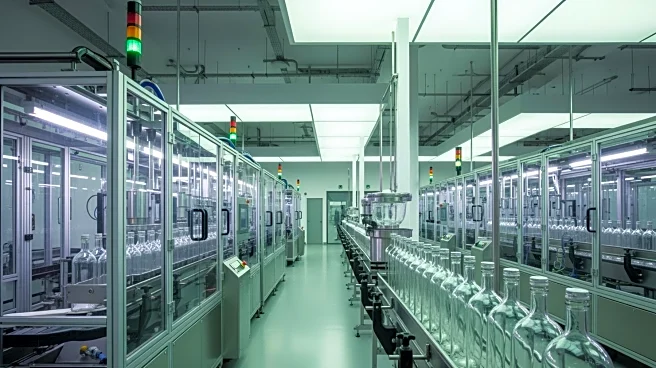What's Happening?
Club Mahindra, a prominent player in India's hospitality industry, has taken a significant step towards sustainability by installing in-house Glass Bottling Plants (GBPs) across its resorts. This initiative aims to eliminate the use of single-use plastic
bottles, which previously contributed to substantial waste generation. The GBPs purify, bottle, and reuse glass containers, effectively reducing carbon emissions and setting a new benchmark for sustainability in the hospitality sector. The process involves a multi-stage purification system that ensures the water meets or exceeds BIS and WHO standards. The purified water is stored in stainless steel tanks and bottled in glass containers, which are reused up to 60-80 times. This closed-loop system not only cuts down on waste but also reduces transportation emissions by up to 70%, thanks to the removal of logistics associated with bulk water deliveries.
Why It's Important?
The implementation of Glass Bottling Plants by Club Mahindra represents a strategic shift towards sustainable practices in the hospitality industry. By eliminating single-use plastic bottles, the resorts significantly reduce their environmental footprint, contributing to waste reduction and carbon emission cuts. This initiative aligns with global trends towards eco-friendly operations and sets a precedent for other hospitality brands to follow. The economic benefits are also notable, with the per-litre cost of water dropping by approximately 30-40% once the initial investment is amortized. Additionally, the initiative enhances brand reputation, as guests increasingly associate the use of glass bottles with luxury and environmental responsibility. This move not only addresses environmental concerns but also positions Club Mahindra as a leader in sustainable hospitality practices.
What's Next?
The success of Club Mahindra's Glass Bottling Plants could inspire other hotels to adopt similar systems, potentially leading to widespread changes in the hospitality industry. The scalability of this model depends on economic rationale, regulatory alignment, and cultural readiness. As logistics and packaging costs rise, in-house systems offer lower lifecycle costs and faster returns on investment. Emerging frameworks under India's Plastic Waste Management Rules and Extended Producer Responsibility (EPR) are already incentivizing circular solutions. With the right policy support, this model could become an industry standard, making water truly circular in the hospitality sector.
Beyond the Headlines
The introduction of Glass Bottling Plants in the hospitality industry highlights the importance of integrating sustainability into core operations rather than treating it as a marketing narrative. This initiative reflects a shift from symbolic greening to scientific precision, embodying circular economy design and lifecycle cost efficiency. It also emphasizes the role of cross-functional teams in successful implementation, requiring collaboration between engineering, housekeeping, and sustainability officers. The model demonstrates that luxury and responsibility can coexist, offering a tangible example of how environmental stewardship can be integrated into everyday operations.














